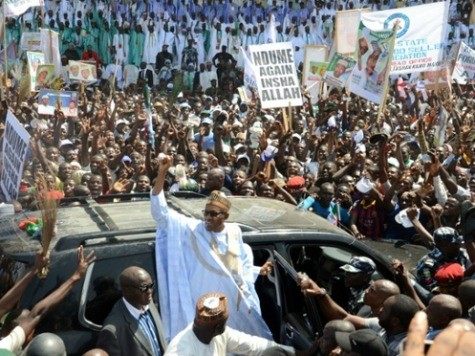Perhaps the greatest success of Nigeria’s elections held last Saturday is that the Islamist terror group Boko Haram has failed to steal the biggest headlines for itself. Former military dictator Muhammadu Buhari is currently leading the polls with half a million more votes that incumbent President Goodluck Jonathan in an election marked more by allegations of fraud than terrorist violence.
Nigeria’s Osun Defender newspaper has called the election for Buhari, who ran against Jonathan in 2011, as well, but lost. The tallies of enough states have yet to come in for most other media to make projections, however, and the vote counting has continued into Tuesday.
The BBC reports that Buhari is currently leading with about 500,000 more votes than Jonathan, with more than half of Nigeria’s states reporting in. Reuters reported that Buhari’s lead was at 2.5 million votes overnight, indicating that the tallies are getting ever closer as the votes trickle in.
The BBC notes that those predicting a Buhari victory are taking into consideration that many of the states yet to report are in northern Nigeria, Buhari’s home region and stronghold as a Muslim candidate. Many of these states–Borno and Adamawa in particularly–have had their infrastructure ravaged by Boko Haram, and it was in their interest that the election was moved from February to March, allowing the government more time to organize an election in volatile areas.
So far, Buhari has won Nigeria’s two biggest states, Lagos and Kano.
Jonathan has only one state in which he has swept successfully: southern Rivers state, where the official tally shows him ahead by 1.4 million votes, according to Vanguard. Rivers has been the most hotly contested state and home to the most unrest and violence at the polls. Authorities quelled an angry crowd with tear gas over the weekend, prompting Buhari’s All Progressives Congress (APC) party to call the election in that state a “sham and a charade.”
Nigeria’s election commission (IPEC) has refused to cancel the results coming in from Rivers state, however, claiming that the voting process was streamlined and efficient at the polls despite any unrest surrounding them.
Though currently in the lead, APC members have taken to the streets throughout Nigeria to protest the election.
APC protest underway in Asaba, Delta State – Okonta Emeka reports #Nigeriadecides #Nigeria2015 pic.twitter.com/wUzonVLLVk
— On Our Radar (@OnOurRadar) March 31, 2015
Jonathan’s People’s Democratic Party (PDP) has also begun to contest the election. Vanguard reports that the PDP is officially contesting the results in Kano, Jigawa, Kaduna, Gombe, Bauchi, Katsina, and Kogi States. Buhari has officially won all these states, except Bauchi, which fell victim to a Boko Haram attack on Saturday.
Specifically, the PDP is claiming that under-aged children were allowed to vote in these states, with a spokesman for the party stating, “In Kano and some of these states in the North, majority of voters were under-aged. Voting also took place in the night, and you know that in the night rigging can take place.”
Should Buhari win the election and President Jonathan step down peacefully– even if contesting the results of the election through the national commission– it would be Nigeria’s first democratic transfer of power. The New York Times notes that, given the APC and PDP dynamic in which Buhari and Jonathan have competed for the executive position before, Buhari’s victory could lead to a competitive two-party system. The Times notes, however, that over 800 people were killed during the 2011 elections in street violence related to the vote.
Of major concern is the fact that Buhari has proven to have autocratic tendencies by having been a former military dictator. As The Wall Street Journal notes, Buhari ran Nigeria for 20 months in 1983 after staging a coup. His tenure was most famous for a campaign called the “War Against Indiscipline,” which the newspaper notes involved “police whipping people who showed up late for work or cut in lines.”
Nonetheless, many suggest that Buhari’s appeal to Nigerian voters is precisely this military background, a strong counterweight to the chaos Boko Haram has cemented in the north. Buhari has campaigned on taking a strict approach to the destruction of the group, rejecting the idea of any “peace talks” and making the defeat of the group a major campaign promise.
Election results are expected to continue being released late into Tuesday.

COMMENTS
Please let us know if you're having issues with commenting.